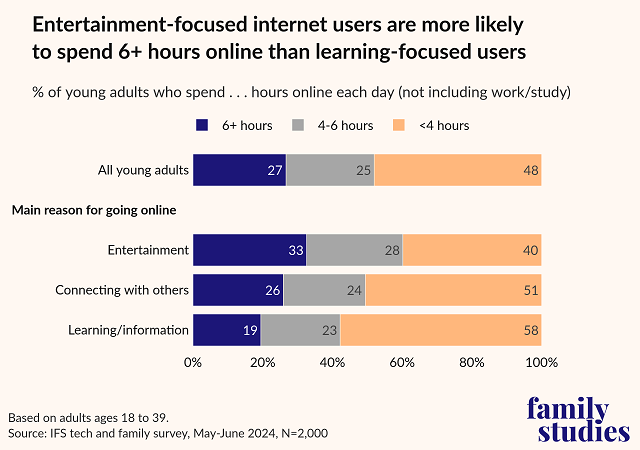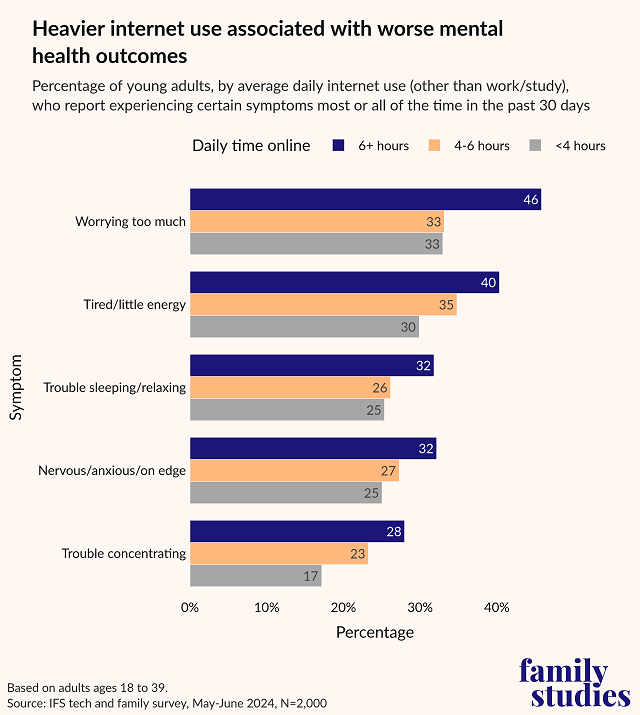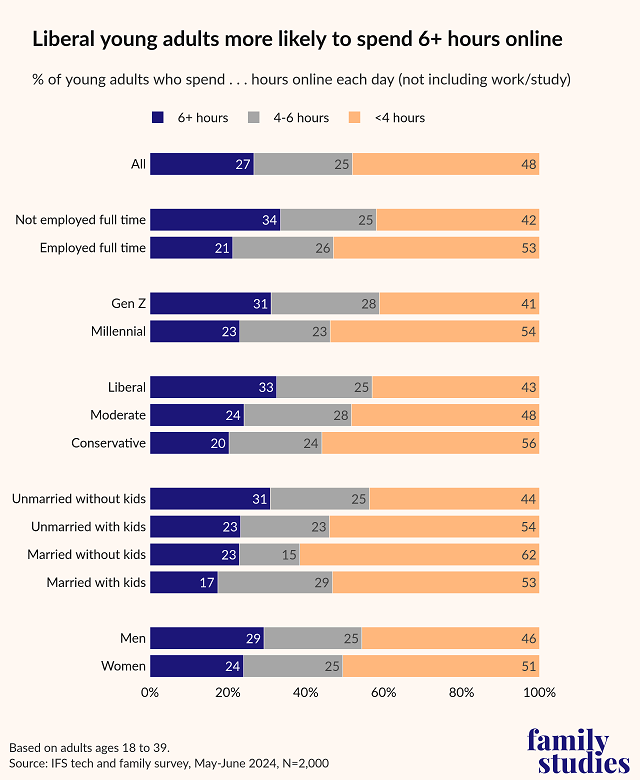Highlights
- Married young adults with children are the most likely to report that they would be happy and peaceful without access to the internet. Post This
- Our study found that respondents who spent more time online had higher rates of certain mental health symptoms. Post This
- Half of those who mainly access the internet for entertainment would be anxious or frustrated without it, versus 39% of those who mostly go online for learning or information. Post This
Imagine you are at home when your internet service suddenly goes out for the next two hours, preventing you from accessing any online content since your phone can only make calls. How would you describe your feelings?
We posted this question to a survey of 2,000 Gen-Z and Millennials under age 40. The responses we received are quite astounding. Although 4 in 10 (46%) young adults say they would feel anxious and frustrated during this outage, 33% would feel indifferent, and 21% would actually feel happy and peaceful. In this age of technology dependence, where nearly half of US teenagers say that they are online "almost constantly” and screen addiction among young adults is on the rise, it is refreshing to see that some younger adults would feel better being offline.
A closer look at the data shows that married young adults with children are the most likely to report that they would be happy and peaceful without access to the internet. About 1 in 3 married young adults with kids (31%) feel this way, compared with only 16% of their peers who are unmarried and childless. Meanwhile, conservative young adults are more likely than their liberal peers to find peace during an internet outage (23% vs. 16%), and so are religious young adults versus those who never or rarely attend religious services (26% vs. 18%).
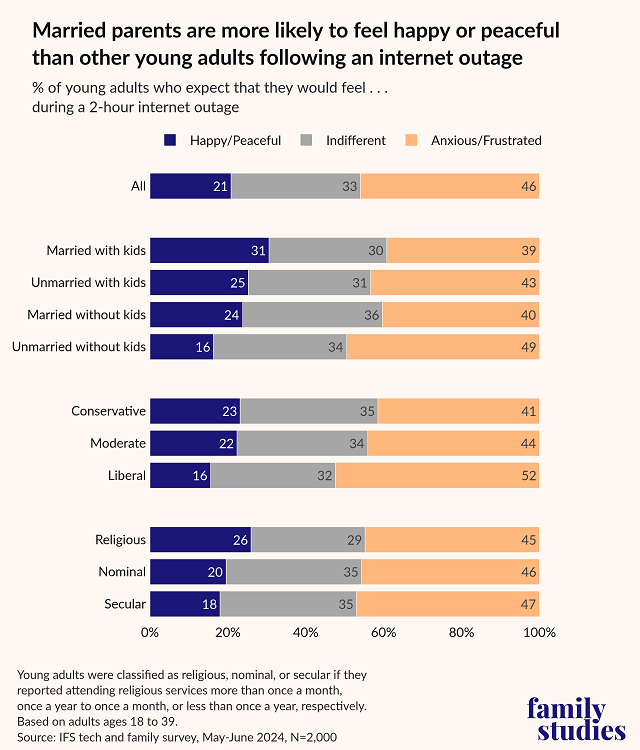
One possible reason for these differences is that these groups of young adults are already spending less time online than others (and thus would be less upset when they're unable to do so). The same survey suggests that whereas 31% of unmarried young adults without kids report spending six or more hours online each day (not including work or study), only 17% of married respondents with children do (27% of all respondents spent an average of 6+ hours online every day). In addition, while 33% of liberal respondents say that they are online for six or more hours each day, only 24% of moderates and 20% of conservatives say the same.
Entertainment is the Top Reason Young Adults Go Online
Time online matters, but what young adults do online is another important factor that is often missed in the research of young adults’ social media use. More than 4 in 10 respondents say that their main reason for going online (aside from work/study purposes) is entertainment. Meanwhile, close to one quarter of young adults (23%) report connecting with others and a similar share (24%) cite learning and searching for information as their main reason for internet use during their free time.
Never-married and childless young adults are more likely to use the internet primarily for entertainment than others. About half of them cite entertainment as their main reason to go online, compared with about one third of their peers who are married with children (35%). At the same time, higher shares of secular young adults (53%), men (52%), and young adults without a college education (49%) go online for mainly entertainment purposes.
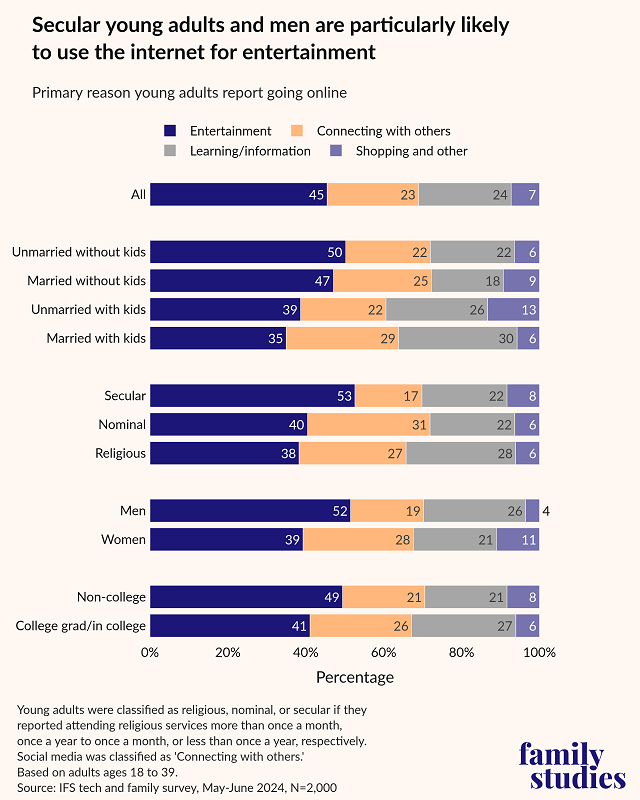
Internet Use Linked to Tech Dependency
We also find connections between respondents' main reasons for going online and their responses to an internet outage. Half of respondents who primarily access the internet for entertainment say they would be anxious or frustrated if the internet goes out; meanwhile, only 39% of those who mostly go online for learning or information say the same.
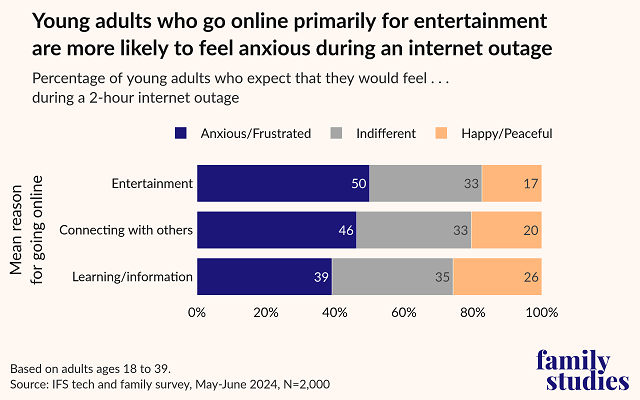
Half of Young Adults Spend Too Much Time Online
When asked about the amount of time they spend online, about half of young adults say they spend too much time. Different reasons for going online are linked to self-assessment of internet usage. Young adults who mainly use the internet for entertainment are more likely (58%) than those who mainly search for information or learning (40%) to say that they spend too much time online.
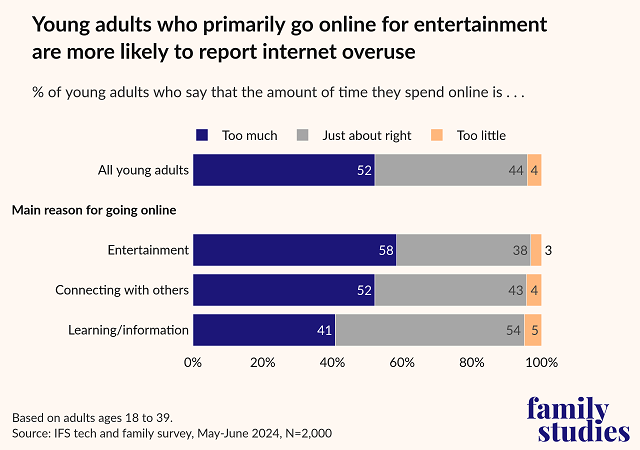
How young adults feel about their time online is a good indicator of the amount of time they actually spend online. We find that young adults who mainly use the internet for entertainment purposes are indeed spending longer hours online. For example, around 1 in 3 young adults who primarily go online for entertainment report spending six or more hours online each day (excluding work/study activities); meanwhile, only 19% of those who go online for learning or information do (see chart in Appendix).
Mental Health Concerns
Heavier internet use is linked to worse mental health outcomes, as previous research suggests. Similarly, our study finds that respondents who spend more time online have higher rates of certain mental health symptoms. For instance, 46% of respondents who spend six or more hours of their free time online each day report that they often worry too much, compared to 1 in 3 respondents with less internet usage. Similarly, 28% of respondents who spend at least six hours online say they often have trouble concentrating; meanwhile, only around 1 in 6 respondents with fewer than four hours of daily time online report this symptom.
We also find a connection between entertainment-focused internet use and higher rates of several mental health symptoms. For example, almost 4 in 10 respondents who mainly use the internet for entertainment (39%) report worrying too much in the past month, whereas only 31% of those who mainly go online for learning and/or information do. Similarly, 38% of entertainment-focused internet users report feeling tired and/or having low energy, and 25% report feeling down, depressed, or hopeless; for information-focused users, these percentages are 28% and 16%, respectively.
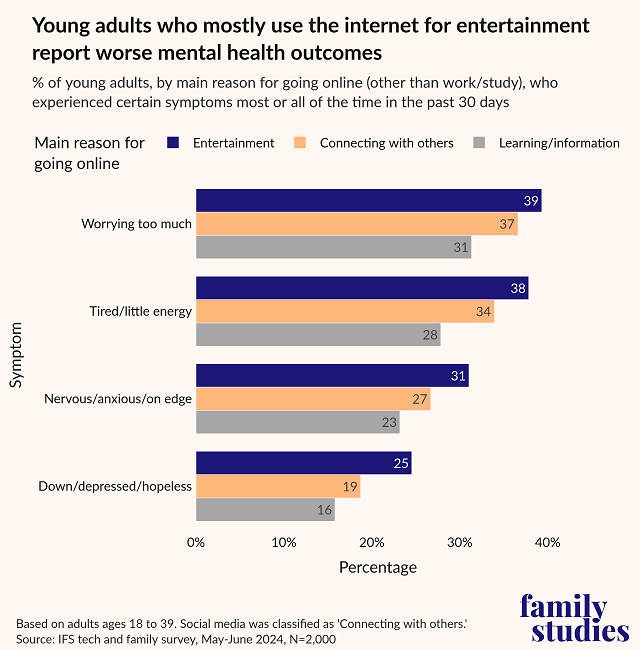
As shown in the earlier analysis, entertainment-focused internet use goes hand-in-hand with longer time online, and both are linked to worse mental health outcomes. These relationships are not necessarily causal. It's possible, for instance, that the converse is true: those with more difficulty concentrating or less energy might be more predisposed to spending hours on TikTok. Even so, these results suggest that a digital detox could be worth trying, especially for 'chronically online' young adults. The fact that the majority of young adults would be either indifferent or at peace with an internet outage, and that the heaviest users experience adverse mental health outcomes, may illuminate why almost half would prefer a world without the Internet, as a recent UK study found.
For better or worse, the internet is here to stay. But negative outcomes are not inevitable. The effects of technology use are mitigated by other aspects of an individual’s life. Our findings suggest that an active faith and vibrant relationships are key to experiencing happiness offline. They also suggest that intentionality matters. How we choose to use the internet—whether as a tool to connect with others or gain knowledge, or as a device for passive consumption—goes a long way in determining how it affects our mental health.
Wendy Wang is Director of Research at the Institute for Family Studies. Ken Burchfiel is a Research Fellow at the Institute for Family Studies. Jared Hayden is a Policy Analyst for the Family First Technology Initiative at the Institute for Family Studies.
Appendix: Additional Charts
